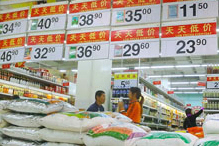
Typical street scene in Santa Ana, El Salvador. (Photo: iStock)
IMF Survey: Inflation Risks Have Reemerged, Says IMF's Lipsky
May 8, 2008
- Inflation risk back as global challenge
- Rising energy and commodity prices central to new concerns
- Requires policy response by governments to promote energy investment and agriculture
The prospect for continued relatively strong growth in emerging and developing economies suggests that demand growth for energy and commodities will remain solid, even as global growth is slowing, IMF First Deputy Managing Director John Lipsky said.

Rice on sale in Beijing, China: food prices have been climbing around the world. (photo: Newscom)
Speech at Council on Foreign Relations
In a speech at the Council on Foreign Relations, he called for a strong policy response by governments around the world to address commodity supply bottlenecks and longer-term supply issues while tackling inflationary risks.
Lipsky warned that the recent pickup in inflation rates around the world in part reflected the impact of higher energy and commodity prices. "This inflation speed-up must be taken seriously as it creates potentially significant challenges to economic stability that could undermine prospects for restoring the combination of solid growth and low inflation that prevailed earlier in this decade," Lipsky stated.
"To put the issue starkly, inflation risks have reemerged as a global challenge following a long absence," Lipsky added.
He called on governments to initiate steps to encourage investment in energy, reduce biofuel subsidies, and improve agricultural policies. He said the IMF was also working to help developing countries that have been worst affected by the commodity hikes and to develop strategies that can be adopted by member countries.
Prices underpinned by strong growth
Demand for commodities has remained robust because of strong growth in emerging and developing economies, led by China and India. These economies' growth is more energy- and commodity-intensive than that of more developed economies.

Lipsky warned of rising concerns about inflationary pressures. (IMF file photo)
In fact, emerging and developing economies as a group have accounted for about 95 percent of the growth in demand for oil since 2003.
As spare capacity and inventories have dwindled, the oil market has become highly sensitive to news of supply disruptions and geopolitical events. This has pushed oil prices to all-time highs in real terms, surpassing their 1979 peak by some 16 percent.
The IMF also forecasts that food prices will remain high. "With only temporary relief likely, we expect that agricultural prices will remain high for the foreseeable future, as supply responses may require both new investment and policy reforms. This will take time," Lipsky said. "Hopefully, the inflationary impulse from higher food prices will wane, even if prices do not retreat significantly. However, this also indicates that the humanitarian challenges of higher food prices will not disappear anytime soon."
Policy responses
Lipsky said that, in the IMF's view, policies will need to adjust both to the reality of permanent relative price shifts and, in some cases, to a broader resurgence in inflation.
Advanced, emerging, and developing economies alike have a role to play in ensuring that policies do not hinder the restoration of demand-supply balances in commodities markets. He identified a number of appropriate structural policy responses:
• Promoting a demand response while cushioning vulnerable groups. Given that some portion of the latest increases in oil prices appears to be durable, allowing a demand response to the reality of higher oil prices will be crucial. Indeed, the pass-through of changes in international oil prices to domestic prices would help promote an inevitable demand response to changing market conditions and encourage conservation. At the same time, well-targeted policy supports should be put in place to protect the most vulnerable groups.
• Encouraging investment in the oil sector. Policies are needed to foster greater investment in oil. These include efforts by oil producers—particularly those in emerging and developing countries—to ensure that investment regimes are stable and predictable; encourage greater cooperation and synergies between national and international oil companies through well-designed partnerships; and facilitate the establishment of an orderly, predictable, and transparent market through improved data dissemination on demand and supply conditions.
• Reducing biofuel subsidies. Efforts to reduce the level of protectionism and subsidies aimed at stimulating biofuels production would remove distortions and allow for greater overall efficiency. In addition, policies to increase conservation and energy efficiency would help moderate the growth in energy demand.
• Improving agricultural policies. Without sufficient infrastructure to increase cultivation, boost productivity, and to bring agricultural products to the market, the supply response in many emerging and developing countries may remain elusive. Thus, policies should aim to upgrade infrastructure, distribution, and storage systems; expand irrigation systems; and redirect subsidies toward high-yield products and key agricultural inputs such as fertilizer. At the same time, subsidized production in advanced countries should be phased out over time, rather than continue to undercut production incentives in developing and emerging economies.
Macroeconomic policies also critical
• In the United States, policy interest rates have been lowered significantly as the growth outlook has deteriorated. As U.S. growth recovers, developments in inflation and inflationary expectations will assume greater importance for policymakers. The 2008 fiscal stimulus should help provide some cushion for demand. However, new fiscal measures could focus on stabilizing key sectors that are vital to limiting downside risks to growth, such as the housing sector and the financial system.
• In the euro area, the sharp rise in inflation and concerns about potential deterioration in inflationary expectations are dampening consumer confidence and spending. The inflation outlook appropriately is central to the policy considerations of the European Central Bank. Policy prospects could shift, however, if inflationary expectations remain well anchored and slowing growth reduces inflationary pressures. For Japan, core inflation remains very low at 0.1 percent, and given the uncertainty concerning growth prospects, Bank of Japan policy is not expected to change soon.
• In emerging economies whose currencies are closely linked to the dollar and that are facing overheating concerns, macroeconomic policies need to be tightened in response to generalized inflationary pressures. In China, movement toward a more flexible exchange rate regime could provide greater scope for effective and stabilizing monetary policy action. Among Middle Eastern commodity exporters, fiscal spending should be aimed at alleviating supply bottlenecks—particularly related to infrastructure—that have contributed to inflation pressures.
IMF's role
Lipsky said that the IMF was working with other international organizations on a coordinated response to the food crisis. It is also focusing on several areas within its mandate, including:
• The provision of financial assistance and policy advice to countries that are negatively affected by the latest international price developments; in particular, the IMF is in active discussion with 10-15 low-income member countries regarding possible balance of payments financing.
• Economic research aimed at a better understanding of the causes of the recent energy and food price increases, the effect of financial fundamentals on prices of oil and other key commodities, and the impact of fuel and food prices on overall inflation and on the macroeconomic outlook more generally.
• Development of risk management and mitigation tools and strategies that could be used by our members.
Comments on this article should be sent to imfsurvey@imf.org


